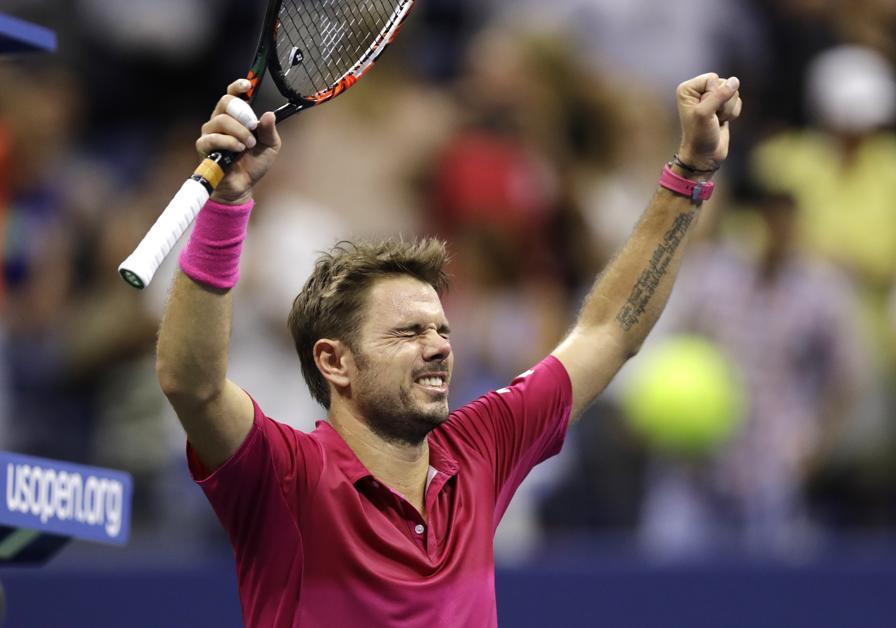
NEW YORK — Stan Wawrinka is the first to acknowledge he hasn’t always been the most consistent player — or the strongest mentally. That’s why, when he shows his mettle during a match, he likes to point his right index finger to his temple.
That signature gesture got a lot of use in the US Open final Sunday, when No. 3 seed Wawrinka surprisingly managed to wear down top-seeded Novak Djokovic and beat the defending champion 6-7 (1-7), 6-4, 7-5, 6-3 for his first US Open title and third Grand Slam trophy overall.
‘‘He was the better player. He was tougher mentally,’’ said Djokovic, offering two of the highest compliments a tennis player can receive from the talented and sturdy Serb. ‘‘He knew what to do. And I was just unlucky in some moments. And that’s it.’’
The 31-year-old Wawrinka is the oldest US Open men’s champion since Ken Rosewall was 35 in 1970. He entered the championship final having spent almost exactly twice as much time on court as Djokovic during the course of the tournament: about 18 hours vs. about nine.
‘‘I played quite a lot of tennis these two weeks. I am completely empty,’’ said Wawrinka.
By breaking in the final game of the second and third sets, and by saving 14 of 17 break points he faced, Wawrinka already had gained the upper hand by the time Djokovic clutched at his left leg and grimaced after missing a forehand while getting broken early in the fourth.
Djokovic was granted the unusual chance to have a medical timeout at a time other than a changeover. He removed both shoes and socks so a trainer could help with toe blisters. Wawrinka complained about the six-minute break, and Djokovic looked over and apologized. Later, Djokovic started limping and received more treatment.
‘‘We played almost four hours,’’ said Djokovic, ‘‘and I think I can speak in the name of Stan, as well: We both felt it.’’
Wawrinka has won only five of his 24 career meetings against Djokovic, but has now beaten the 12-time major champion on the way to each of his own Grand Slam titles, including in the 2014 Australian Open quarterfinals and 2015 French Open final.
Playing in the shadow of Roger Federer, his Swiss countryman and good friend, Wawrinka needed until his 35th appearance at a major, at age 28, just to get to the semifinals for the first time.
But he has now won 11 tournament finals in a row, going 3-0 in Grand Slam finals, beating the top seed each time.
‘‘You’re a great champion, a great person,’’ Wawrinka told Djokovic. “Because of you, I am where I am today.’’
‘‘We know each other [for] many, many years, and I had the chance to practice many times with him and to play him on a big stage.’’
. . .
Bethanie Mattek-Sands of the United States and Lucie Safarova of the Czech Republic won the women’s doubles title for their third Grand Slam trophy as a pair. They beat the top-seeded French team of Caroline Garcia and Kristina Mladenovic, 2-6, 7-6 (7-5), 6-4.
Mattek-Sands is the first American to win women’s doubles at Flushing Meadows since 2011, when Liezel Huber and Lisa Raymond did it.
The final was played on the 15th anniversary of the 9/11 terrorist attacks, and Mattek-Sands wore knee-high socks and a left wrist band with the same red-and-white-striped, star-spangled design she did while teaming with Jack Sock to win a gold medal in mixed doubles at the Rio Olympics last month.
‘‘To have this result here has been amazing,’’ Mattek-Sands told the Arthur Ashe Stadium crowd during the trophy ceremony, her eyes welling with tears and her voice choking on her words. ‘‘It’s a special day today here for everybody in New York.’’



